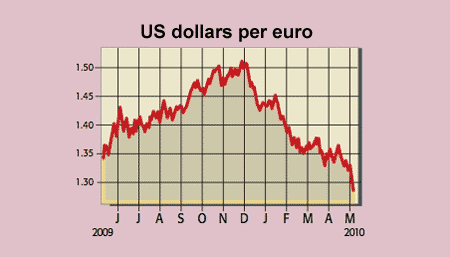
Global markets tanked early this week. Doubts over Greece’s €110bn bail-out and fears that the debt crisis was set to spread to other countries sent Greek, Spanish and Portuguese bond yields up sharply. As Greece was paralysed by violent protests against austerity measures, Spain’s prime minister, Luis Zapatero, dismissed as “madness” rumours that Spain was about to ask for €280bn in aid from its European partners.
Most European indices lost 2%-3% on Tuesday alone. The S&P 500 fell by a similar amount and the FTSE All-World index hit a two-month low. The euro slid below $1.30 to a 15-month low.
What the commentators said
Here we go again, said Nils Pratley in The Guardian. Europe’s politicians stand up on Sunday and trumpet a solution to Greece’s problems, only for investors to decide that it’s insufficient. They “have good reasons” to think the bail-out will postpone, rather than prevent, a Greek default. For starters, the bail-out isn’t even formally agreed yet; it has to work its way through Germany’s parliament.
If the money comes through, “even hard-nosed investors” are wondering “how on earth a democratic government is going to stay the course”, said Stephanie Flanders on bbc.co.uk. The austerity programme Greece has signed up to “isn’t a short, sharp shock, it’s the macroeconomic equivalent of hard labour”.
The rescue plan would worsen recession while debts keep mounting, and Greece can’t devalue its currency to boost growth via exports. In short, Greece faces “an economic death spiral”, as Larry Elliott put it in The Guardian. With virtually no chance of Greece seeing this through, it’s no wonder “confidence in the long-term solvency of the Greek government has collapsed”, said Tristan Hanson of Ashburton.
Meanwhile, jitters over Portugal and Spain could easily become self-fulfilling, said Agnes Crane on Breakingviews.
If the interest rates on their debt spiral ever higher, they will have trouble refinancing and could require rescuing. Portugal and Spain could yet calm the markets by setting out more convincing savings plans, said Pratley. But when a huge bail-out “can’t even produce a 48-hour rally, events are moving too fast for comfort”.
And the eurozone crisis isn’t the only thing worrying investors. China continues to apply the brakes, with manufacturing activity now growing at its slowest pace in six months. As one of the few dynamic economies in the world slows, the American recovery also looks set to fade, said Buttonwood on Economist.com. The growth rate of the ECRI leading indicator of American activity has fallen to a nine-month low. No wonder so many investors are selling in May.